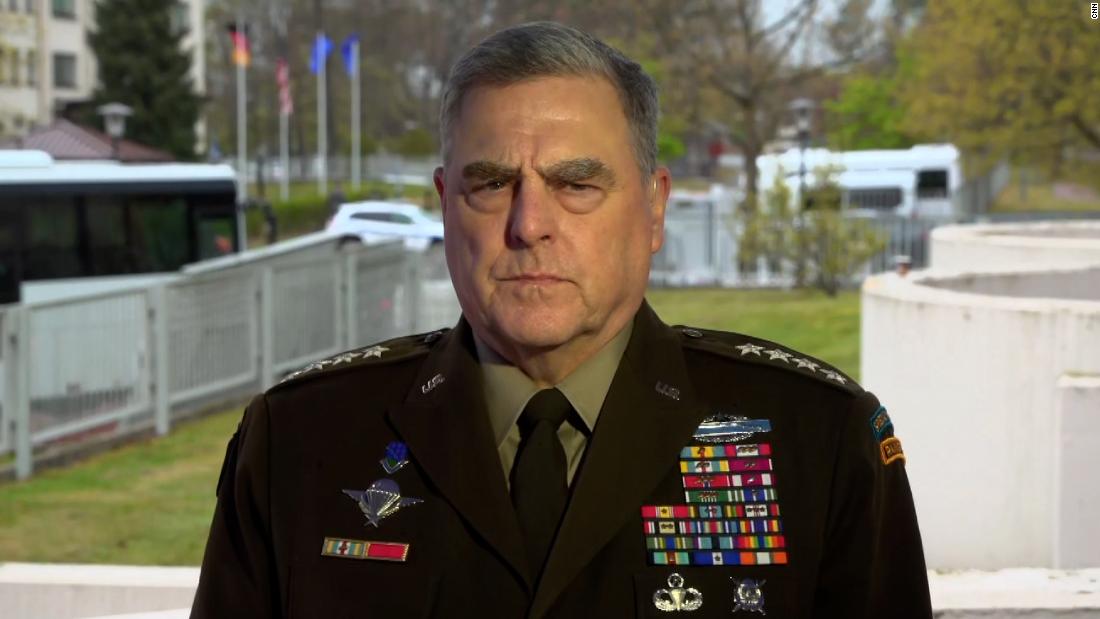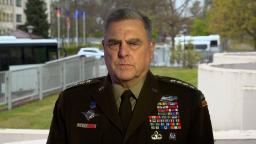

“If this is left to stand, if there is no answer to this aggression, if Russia gets away with this cost-free, then so goes the so-called international order, and if that happens, then we’re entering into an era of seriously increased instability,” Milley said.
“What’s at stake is the global international security order that was put in place in 1945. That international order has lasted 78 years, it’s prevented great power war, and underlining that entire concept is the idea that large nations will not conduct military aggression against smaller nations, and that’s exactly what’s happened here, an unprovoked military aggression by Russia against a smaller nation,” he added.
Milley’s warning about the potential global implications of Russia’s actions in Ukraine also underscores the current sense of urgency felt by the US and its allies as the war enters what they say is a critical juncture.
‘We don’t have any time to waste’
Shortly after Milley’s interview, Austin also stressed the importance of moving quickly to provide Ukraine with the military aid it needs, saying during a news conference that the US and other allies and partners “don’t have any time to waste” when it comes to providing crucial assistance to counter Russia as their invasion continues.
“We don’t have any time to waste. The briefings today laid out clearly why the coming weeks will be so crucial for Ukraine, so we’ve got to move at the speed of war. And I know that all the leaders leave today more resolved than ever to support Ukraine in its fight against Russian aggression and atrocities,” Austin said.
Austin noted Germany’s commitment to send 50 cheetah anti-aircraft systems to Ukraine, which they announced on Tuesday. The British government announced it would provide additional anti-aircraft capabilities to Ukraine as well, and Canada announced it would provide Ukraine with eight armored vehicles, Austin said.
“I applaud all of the countries that have risen and are rising to meet this demand,” Austin added.
Austin also said that he thought Ukraine “will seek to once again apply to become a member of NATO” in the future.
“I think that NATO will always stand by its principles of maintaining an open door. So I don’t want to speculate on what could come,” he said at the news conference.
Austin reiterated that one of the goals of the US is “to make it harder for Russia to threaten its neighbors and leave them less able to do that.”
“Their land forces have been attritted in a very significant way. Casualties are pretty substantial. They’ve lost a lot of equipment. They’ve used a lot of precision-guided munitions. They’ve lost a major surface combatant. And so, they are, in fact, in terms of military capability, weaker than when they started,” said Austin.
Austin also pointed out how the international sanctions on Russia would make it harder for Moscow to replace that lost military capacity.
‘Completely irresponsible’ nuclear saber-rattling
Milley also criticized Russian Foreign Minister Sergey Lavrov on Tuesday over his recent comments about the danger of a nuclear war, saying it was “completely irresponsible” for any senior leader of a nuclear power to start “rattling a nuclear saber.”
“Any time a senior leader of a nation-state starts rattling a nuclear saber, then everyone takes it seriously,” Milley said during his interview with CNN.
Lavrov said Monday that nuclear deterrence is Russia’s “principled position,” but he added, “The danger is serious, it is real, it cannot be underestimated.”
Milley said the US military is monitoring the nuclear threat from Russia along with “friends and allies.”
The US has not seen any indication Russia has made any moves to prepare nuclear weapons for use during the war, but two sources familiar with recent intelligence assessments previously told CNN that US officials are more concerned about the threat of Russia using them than at any time since the Cold War.
CNN’s Henry Klapper contributed to this story.